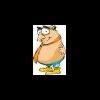Поруке: 17
Језик: English
horsto (Погледати профил) 05. април 2010. 12.59.10
ceigered:Or, more simple, you could say:
A scientist excited about his new research project reporting to his superior:
"Jes! Mi ja penos por fari mian plejn bonan laboron, Sinjoro!"
An elder brother being asked to fix something trivial for his sibling when he really just wants to watch TV:
"Jessss, mi provos......"
Provu premi tiun butonon. (Try to press this button).
But you can't say:
Penu premi tiun butonon.
Because (normally) there are no efforts required for pressing a button.
provi also has the meaning of to test, which peni doesn't have:
Provu tiun butonon.
lavagulo (Погледати профил) 05. април 2010. 14.49.13
Trojo seems to sum it up best when he wrote: "I guess it comes down to which you want to emphasize most -- the effort aspect, or the attempt aspect. Or you could be lazy and always use provi".
I don't want to be lazy but I also don't want to spend a lot of time analyzing everything that I write or say. Communicating with another person should be a more spontaneous effort -- as it is with our own native languages. And that, I suppose, is the key: if we were all native Esperantists, we wouldn't have a problem with instantly choosing between peni, provi, klopodik, strebi, etc. etc.
I'll try to take trojo's advice and I have no doubt that I'll occasionally use the wrong verb.
erinja (Погледати профил) 06. април 2010. 00.18.55
You can learn the other ones and begin to use them when the right occasion arises, but you should consider "provi" as your default, in cases of even minor doubt.
lavagulo (Погледати профил) 06. април 2010. 19.40.03
This thread (peni vs. provi) was very helpful to me and that's why my major focus on this forum is on grammar and vocabulary questions and it's why I encouraged Greyshades to continue his Grammar Debate Topics. For me, it is simple. The lernu website is dedicated to helping others learn Esperanto. Therefore, questions about grammar, vocabulary and usage should never be off limits.
Let's see -- in the past week I've asked and found out more about the following words: zorgi and its derivitives, olda/oldulo, peni and provi. And in each case, I've discovered things that were not readily available in dictionaries and textbooks.
Obviously, Esperanto dictionaries and textbooks and websites such as the Reta Vortaro aren't always enough.
ceigered (Погледати профил) 07. април 2010. 08.13.48
lavagulo:Obviously, Esperanto dictionaries and textbooks and websites such as the Reta Vortaro aren't always enough.Mi pensas ke unu grandeta problemo estas ke la Esperanta lingvo ne havas sufiĉan anaron por formi supercelatajn vortarojn por lernantojn (ne sufiĉa rimedo, ekz. mono, eblaj aĉetuloj ktp).
-
I think one biggish problem is that Esperanto doesn't have a big enough following in order to form over-specialised dictionaries for learners (not enough resources, eg money, potential customers etc).
At least, not on a large or obvious scale. Surely there are great learner dictionaries out there which could practically teach you the entire language, but they'd have to be hard to find (it'd have to have stuff like an abundance of examples, basic linguistics etc).
erinja (Погледати профил) 07. април 2010. 14.29.22
I see the same sorts of conversations going on in other language-learning forums that I see here, regarding how to distinguish between similar words. It happens even though those other languages are bigger, and probably do have enough market share to support a beginner's dictionary, if someone should choose to publish one. A dictionary is never a substitute for a conversation with someone who speaks the language well, in terms of explaining actual usage.
ceigered (Погледати профил) 07. април 2010. 14.41.10
erinja:A dictionary is never a substitute for a conversation with someone who speaks the language well, in terms of explaining actual usage.Indeed - I was just randomly speculating as to why one might not exist and why one shouldn't get there hopes up (I must be honest, I personally don't really need a beginners dictionary with high detail examples and learning sections, but it would be nice if just to add eye-candy to my bookshelf
 )
) 



